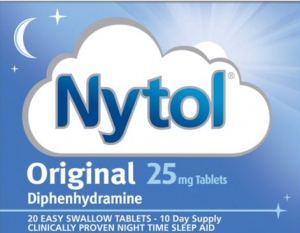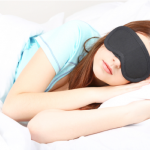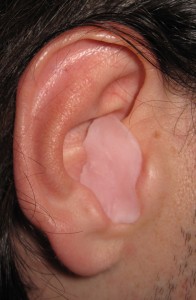Healthy Living: Sleep Problems
If you have been having problems sleeping you are not alone. About one in three people in the general population suffers from problems with sleep. For a number of different reasons people living with schizophrenia tend to experience more than their fair share of sleep problems.3 In fact abnormal sleep patterns are often one of the first problems that relatives and carers notice when an episode of schizophrenia is first beginning. Here is what one person living with schizophrenia, Catrina said about the importance of sleep: “I know the only time I get unwell is when I am sleep deprived so this is an important marker in keeping me well”.
Most adults need seven to eight hours sleep per night. Older people tend to need less than young people. Doctors call difficulty in getting enough sleep insomnia and it can take a number of different forms. Some people may have difficulty falling asleep at night, others may wake early in the morning and not be able to get back to sleep whilst others may wake repeatedly during the night.10
Insomnia can cause you to feel drowsy the next day. It may also cause poor concentration, irritability and a general feeling of unwellness and lack of vigour.10 Whereas if you sleep well you will wake feeling refreshed and energetic and motivated to use your day productively.
Insomnia can also be caused by physical ailments such as breathing problems, urinary infections, coughing etc so it is a good idea to rule these problems out before you start to create a coping strategy for dealing with your sleep problems. If you do suspect any of these problems then it is important to see your GP.
Whilst difficulty with sleeping seems to be another feature of schizophrenia it can also be caused and made worse by some of the other psychological issues that often seem to run side by side with this condition including stress, anxiety and depression.4
The problem of sleep should not be seen as insurmountable since there is a great deal that people living with schizophrenia can do to alleviate it. It is necessary to have a coping strategy and the person living with schizophrenia is often the best person to put this together as they have an intimate understanding of their condition that others around them may not be able to achieve. As with all other aspects of schizophrenia we advocate the person living with schizophrenia taking responsibility for their recovery and becoming their own “case manager”.
The first step is to discuss the problem with your carer, doctor and community psychiatric nurse. Then it is important to research your problem. Advice on insomnia is available on the internet and from your local library who will be able to provide reading material and give you details of local resources such as courses and groups for instance for relaxation or stress management.
You could also usefully talk to your pharmacist and a good herbalist. It may also be a good idea to start to keep a diary at this point. Record how your sleep patterns have been and any factors that you think may have affected it: environmental factors such as noise, times of meals, consumption of tea or coffee etc
Medication options

Nytol is one of the sedating antihistamine sleeping medicines and is available over-the-counter from chemists. (Image: Boots)
Sleeping tablets
One of the first solutions that may be offered by your doctor to help with sleep problems is sleeping tablets. There are a number of different types of sleeping tablets which have a proven effectiveness but one of the most commonly prescribed are the sedating antihistamine group. These include promethazine (Phenergan) which is only available on prescription and Nytol (diphenhydramine) which is available over the counter from chemists. Antihistamines are also used to treat hay fever and sea sickness.
Stronger classes of sleeping tablets such as barbiturates like Phenobarb (phenobarbitone) and hypnotics like Zolpidem are available to doctors but are only issued on prescription.
Whatever type of sleeping tablet you are taking it is vitally important to remember that they should not be taken with alcohol, street drugs, tranquillisers or other sleeping tablets.
However sleeping tablets alone should not be seen as a cure-all for sleep problems. They need ever increasing doses to achieve the same effect and it is possible to become dependent on them.6 For this reason sleeping tablets must be seen as a temporary remedy only. Routine use of sleeping tablets or tranquillisers to aid sleep should be avoided in schizophrenia.2
Remember that sleeping tablets may help you to sleep but they will do nothing to help you cope with any underlying causes of your sleep problems such as anxiety or depression.7 If issues such as these are a factor in your sleep problem then you should think about other ways of coping with them perhaps through psychotherapy, counselling or self help.
Tranquilisers
Tranquilisers may also be prescribed by doctors to help with sleep problems. The minor tranquillisers include Diazepam, Nitrazepam, Lorezapam, Clonezapam, Alprazolam and Oxazepam. In the past these drugs have been prescribed much more widely than they are today but now we realise that routine use of these drugs to aid sleep is probably counter-productive for people living with schizophrenia.
That said some people do find that a low dose of a minor tranquilliser such as Diazepam (Vallium) taken early in the evening can help them to relax and unwind during the evening and put them in a better frame of mind to sleep later on.9
Herbal remedies

Valerian plant: the extract has traditionally been used as a remedy for sleep problems. (Image: Franz Xaver on Wikimedia Commons)
Some herbal remedies are available but unfortunately there is a real lack of hard research evidence as to their effectiveness. Many are based on Valerian which has been used for many years to treat mental health problems. In fact it was prescribed widely by doctors during the blitz to help with anxiety.
Alcohol
Alcohol should not be used to help with sleep problems. It may well help to get you off to sleep initially but as the alcohol level in your blood drops during the night you will wake again a few hours later.11 It may also cause you to get up during the night to use the toilet thus interrupting your sleep further.
In any case consumption of alcohol is something that you should give very careful thought to if you are living with schizophrenia. Routine consumption of alcohol will put you at increased risk of dangerous behaviour, cause you to have more relapses12 and further complicate any behavioural problems that you are already experiencing. In general it has no place in a successful recovery strategy.

Valerian extract was used during WW2 as a treatment for anxiety and insomnia.
Lifestyle Changes
Apart from medication there are also a number of other ways in which you can improve your sleep patterns. Here are some hints to help you sleep well at night:
1. It is important to keep the night for sleeping and not to sleep during the day if possible.
2. Make sure that the room you sleep in is comfortable and neither too hot nor too cold. Try to keep this room only for sleeping.5
3. Pay attention to the bed. If your mattress is old and unsupportive replace it.
4. Even if you are not working at the moment it is important to have a structured day with stimulating activities. Sitting on the sofa watching day time TV for most of the day will not provide sufficient exertion to leave you tired when the evening comes.
5. If you work and are on a late shift or if you are studying in the evening try to allow a couple of hours to switch off and unwind before going to bed. Don’t try to go straight from work to bed.
6. Try to get some physical exercise each day such as walking, running or swimming.
7. Don’t consume coffee, tea or energy drinks like Red Bull during the evening or late afternoon. These contain caffeine which is a stimulant and will prevent you from sleeping well.
8. Don’t eat your evening meal too late.5 Try to leave at least two hours between eating and going to bed.

Sleep masks like this are inexpensive and can be bought from Boots. (Image: Africa Studio on Shutterstock)
9. Many people find that taking a hot milky drink such as Ovaltine, Horlicks, hot chocolate or cocoa before bedtime helps them to sleep.
10. Try to spend a little time before going to bed relaxing and winding down. Reading, listening to music or relaxation exercises are all good for this.5
11. Sleep problems can often be caused by environmental factors such as noise outside or a room that isn’t dark enough (say because of street lights outside). Make sure that your curtains are effective at keeping out the light and if not buy a sleep mask from Boots (the type that people use when going on long flights). Similarly if noise is a problem invest in some wax earplugs from Boots. (http://www.boots.com/)

Wax ear plugs are an excellent way of cutting out noise when you are asleep they are available from Boots stores or http://www.earplugs.co.uk/Quies-Natural-Wax/p-457-1383/ (Image: Lead holder on Wikimedia Commons)
What to do if you can’t sleep
So you have followed all the above information and gone to bed and you still can’t sleep. It happens to all of us sometimes. But there are techniques for helping to sleep.
First of all if you haven’t fallen asleep within about half an hour of going to bed then don’t try to fight it. Don’t lie in bed worrying about it. At this point get out of bed and go into another room. Potter around, reading or listening to music until you start to feel sleepy again then return to bed and try again.
If that is still not successful then after another half an hour get up and repeat the cycle. Continue this cycle until you eventually fall off to sleep.
Changes in body clock
Difficulty getting off to sleep or interrupted sleep patterns such as are described above are one thing but a common feature of schizophrenia and which is pretty well unique to the psychotic illnesses is the complete reversal of the person’s body clock. They will remain awake during the night and then retire to bed as the dawn breaks.1 This can be a very disruptive problem for the family they are living with and can lead to conflicts with neighbours. But there are a number of different strategies for coping with this problem.
Don’t fight it
The first strategy that has been employed successfully by people living with schizophrenia who experience this problem is not to try to fight it but rather to accept that you will be awake during the night and find useful ways of occupying your time that will not disturb the people that you live with. Clearly vacuuming the living room at 2.00 am in the morning is out of the question but there are other ways in which you can occupy your time that won’t be as disruptive to others.
Rufus May, a well known campaigner for people with schizophrenia who experienced psychosis and then went on to become a clinical psychologist, coped with this problem by finding a job on the night shift at his local cemetery.13 There are many other types of work that need people to work during the night including call centres and bakeries amongst others.
However if you don’t feel up to full time employment just yet there are other options. There are types of part time home working such as proof reading that can be done at any time of the day or night and there are options for studying by distance learning such as Open University courses which will also allow you to work at night and sleep during the day. (Open University courses usually attract reduced fees for people on low incomes or certain types of state benefits. (See http://www.open.ac.uk/choose/collegeroutes/fees-and-support).
If you do opt to work at home the key is to adopt a lifestyle that does not disturb the other people in the house or your neighbours who are trying to sleep. It would also be a good idea to discuss this with the people that you live with so that they are aware of what you are doing. This is important. Of course it is important to keep them on side in your recovery but in addition if they know that you work at night and sleep during the day they may well try to reduce the amount of noise that they make during the day to help you to sleep.
It would be a good idea to agree some house rules with the people that you live with. These could include things like only listening to music through headphones, not wearing shoes at night and not doing any noisy activity. In return the other people in the house could agree not to wake you until noon and to be careful about the noise they make while you are sleeping.8
For most people living with schizophrenia and experiencing an upturned body clock they will find that these measures need only be temporary and that eventually their body clock will return to normal. If however there are residual symptoms of insomnia the information above may be useful.
References
1. Howe G, 1991, The Reality of Schizophrenia, Faber and Faber, p29.
2. Linter B, 1996, Living with Schizophrenia, Vermillion, p67.
3. Burton N, 2012, Living with Schizophrenia, Acheron Press, p90.
4. Burton N, 2012, Living with Schizophrenia, Acheron Press, p91.
5. Burton N, 2012, Living with Schizophrenia, Acheron Press, p93.
6. Burton N, 2012, Living with Schizophrenia, Acheron Press, p93.
7. Jones S and Hayward P, 2004, Coping with Schizophrenia, One World, p81.
8. Howe G, Sheldon Press, 1997, Serious Mental Illness – A Family Affair, p74.
9. Author’s personal experiences.
10. Patel V, 2002, Where There Is No Psychiatrist, Gaskell, p96.
11. White J, 2006, Stress Control, Clydebank Health Centre, Glasgow.
12. Fuller Torrey E, 2001, Surviving Schizophrenia, Quill, p309, p345.
13. Dr Rufus May: One man and a Bed, The Independent, 6th August 2006, viewed on line 21/08/13.







